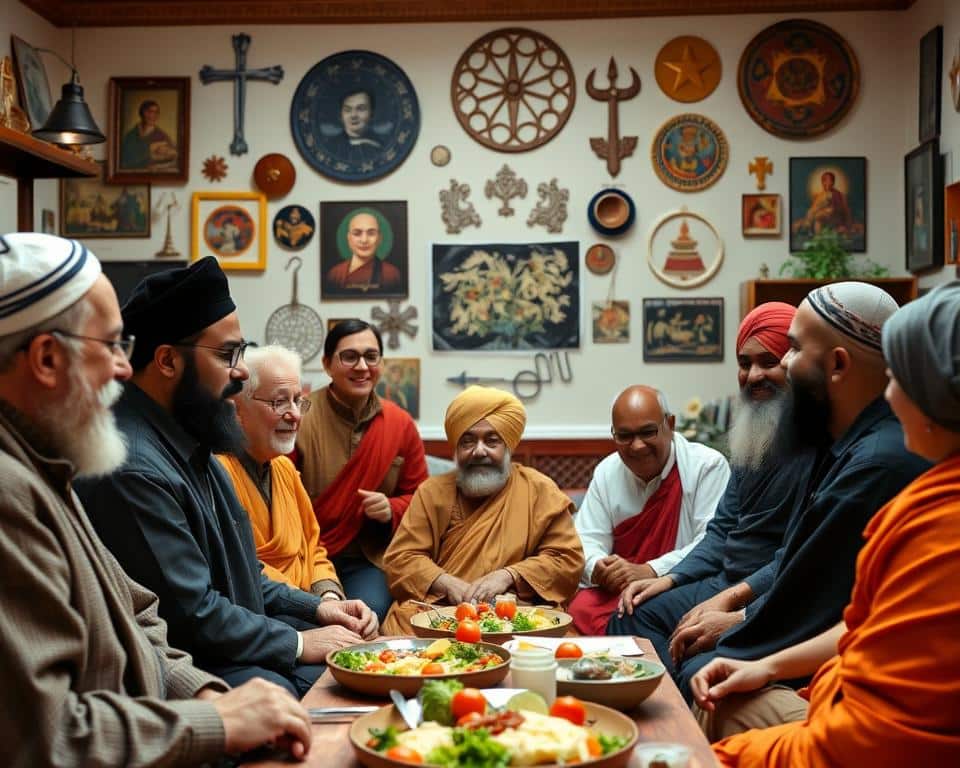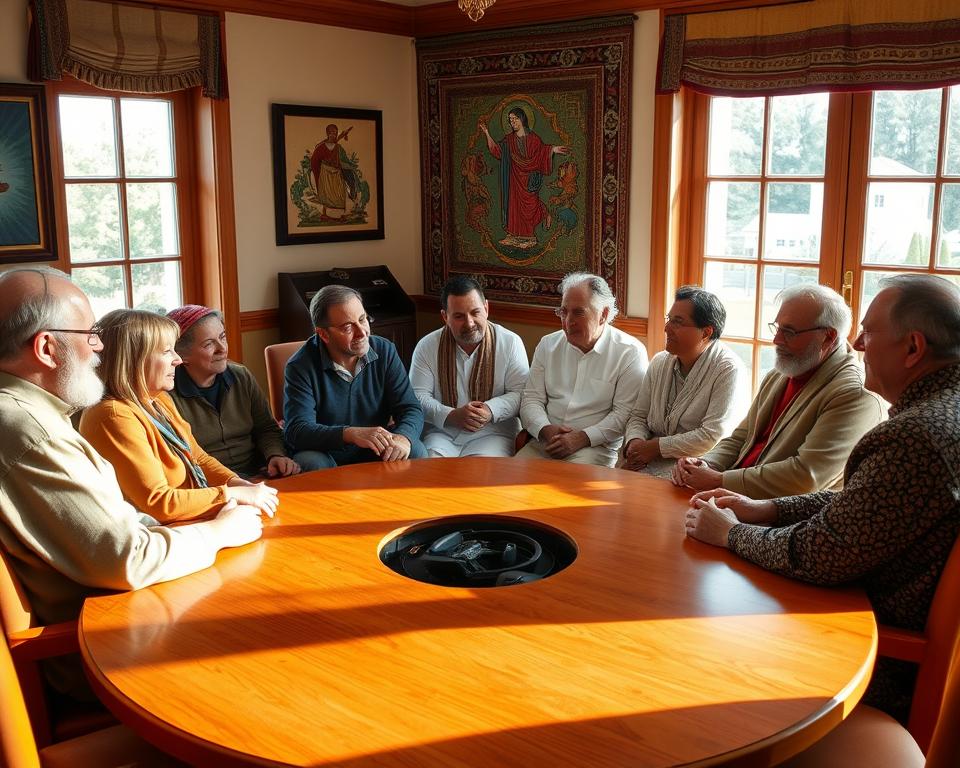Have you ever wondered how to have meaningful conversations with people of other faiths? Interfaith dialogue isn’t about compromising beliefs—it’s about building bridges. Scripture encourages us to “live at peace with everyone” (Romans 12:18), and these discussions can help foster understanding in a divided world.
From global events like the World Day of Prayer for Peace to local faith gatherings, Christians have opportunities to listen, learn, and share God’s truth with humility. The key? Approach these talks with curiosity and respect, keeping your faith rooted in Christ.
Ready to explore how you can engage thoughtfully? Let’s dive in.
What Are Interfaith Dialogues?
Understanding different faiths starts with open, structured conversations. These discussions aim to explore beliefs, not debate them. Scripture reminds us to “speak the truth in love” (Ephesians 4:15), which guides how we engage with other religions.
Definition and Purpose
Faith-based talks fall into three categories:
Ecumenical (between Christian denominations), interfaith (among Abrahamic traditions like Christianity, Islam, and Judaism), and interreligious dialogue (including all religions, such as Hinduism or Buddhism). The goal? Mutual respect and learning.

Historical Examples of Cooperation
16th-century Mughal India: Emperor Akbar promoted tolerance, uniting Hindus, Sikhs, and Muslims under fair policies. His court hosted debates to celebrate diverse traditions.
1263 Disputation of Barcelona: A famed discussion between Jewish and Christian scholars, moderated by King James I of Aragon, modeled civil discourse despite deep differences.
Modern efforts include the 2009 World Economic Forum panel with Archbishop George Carey and Rabbi Jonathan Sacks. Later, the 2011 World Day of Prayer for Peace brought Catholic, Protestant, and Orthodox leaders together.
These moments in history show how dialogue fosters peace. They remind us that listening first builds bridges.
Why Interfaith Dialogues Matter for Christians
Jesus modeled love across boundaries; His followers can too. These conversations aren’t just about tolerance—they’re about living out God’s command to “love your neighbor” (Mark 12:31). When we engage with other faith groups, we reflect Christ’s heart for humanity.

Building Mutual Respect and Understanding
Hartford International University’s motto says it well: “Exploring differences deepens faith.” Learning about others’ rituals, like the Jewish Sabbath, fosters empathy. Students in interfaith classrooms often find their own beliefs strengthened through dialogue.
Respecting others’ beliefs doesn’t mean abandoning truth. It means listening first—just as Jesus did with the Samaritan woman (John 4). This builds bridges where walls once stood.
Strengthening Community Bonds
Shared projects, like interfaith food drives, turn theory into action. The Nansen Dialogue Centers show how post-conflict regions rebuild trust through collaboration. Serving humanity together unites communities beyond theological differences.
When churches partner with other faith groups, they embody Paul’s call to “live at peace with everyone” (Romans 12:18). Practical unity—not uniformity—becomes the goal.
Practical Steps to Start Interfaith Conversations
Starting meaningful faith-based conversations requires intention and practical tools. Whether you’re at a community event or a coffee shop, these strategies will help you engage with humility and clarity.
Listen First, Respond Second
Active listening builds trust. The KAICIID Dialogue Centre trains participants to focus on understanding, not debating. Try these tips:
- Acknowledge: Nod or paraphrase to show you’re engaged.
- Ask: “What’s most important about this tradition to you?”
- Affirm: “Thank you for sharing that—it helps me understand.”
Jesus modeled this in John 4, asking the Samaritan woman questions before teaching. Follow His example.
Ask Open-Ended Questions
Questions unlock deeper dialogue. Living Room Conversations offers free guides with prompts like:
“How does your faith shape your daily life?”
Avoid yes/no questions. Instead, explore stories and values. This process fosters mutual learning.
Share Your Faith Experiences
Personal stories resonate more than doctrinal debates. Say, “I felt God’s presence when…” instead of quoting theology. The New Mexico Interfaith Dialogue group uses this approach in monthly meetings.
Remember Paul’s words: “Let your conversation be always full of grace” (Colossians 4:6). Your story might plant seeds of hope.
Examples of Successful Interfaith Dialogues
From historic gatherings to local partnerships, faith-based initiatives are shaping a more peaceful world. These efforts prove that mutual respect and shared action can transform communities. Let’s explore inspiring examples.
Global Initiatives Like the Parliament of the World’s Religions
Since 1893, the Parliament has connected 200+ faith traditions. Its 1993 “Declaration Toward a Global Ethic” outlined shared values like justice and nonviolence. Today, it hosts forums where leaders from Christianity, Islam, Buddhism, and more collaborate on climate change and poverty.
The United Nations Alliance of Civilizations amplifies this work. Their youth programs train emerging leaders to resolve conflicts. One participant shared,
“We learned peace starts with listening—even when beliefs differ.”
Local Church-Led Interfaith Events
Churches are sparking change in their neighborhoods. St. James Church in Texas hosts annual interfaith Thanksgiving dinners, uniting Muslims, Jews, and Christians. Pastor Lydia notes, “Breaking bread together reminds us we’re all God’s children.”
Projects like Hands Across the Hills bridge rural divides. This initiative links Massachusetts and Kentucky communities through storytelling and service. Meanwhile, the Ikeda Center’s workshops equip faith groups to advocate for social justice.
These examples show how small steps—meals, dialogues, or service—can build lasting peace. As Scripture urges, “Let us pursue what makes for peace” (Romans 14:19).
Common Challenges and How to Overcome Them
Engaging in faith conversations isn’t always easy, but it’s worth the effort. Differences in belief can lead to conflict, yet Scripture reminds us to “be completely humble and gentle” (Ephesians 4:2). With practical tools, you can turn these challenges into opportunities for growth.
Addressing Theological Differences Respectfully
Start with shared values like charity or justice. Sociologist Peter L. Berger warns against debates that fuel division. Instead, apply Jesus’ words: “Do to others as you would have them do to you” (Matthew 7:12).
Pope Francis’ 2013 call for “sincere dialogue” with atheists models humility. Focus on listening first. Ask, “How does your faith shape your view of compassion?” This builds bridges.
Navigating Cultural Sensitivities
Cultural issues require extra care. KAICIID’s guides on Muslim-Christian interactions highlight simple steps:
- Learn basic greetings in their language.
- Avoid assumptions about customs.
- Rotate facilitators to prevent “dialogue fatigue.”
Like Paul adapting to diverse audiences (1 Corinthians 9:22), small changes foster respect.
Every conversation is a chance to reflect Christ’s love. As you navigate differences, remember: change starts with humility. Even in conflict, God’s truth shines brightest.
Taking the Next Step in Interfaith Engagement
Ready to put hope into action? Small steps can lead to big peacebuilding efforts. Start by joining local groups like the Sustained Dialogue Institute or your city’s interfaith council. These spaces foster meaningful connections.
For deeper learning, Hartford International University offers courses on faith studies. Or keep it simple—invite a neighbor of another belief for coffee. As the Dalai Lama said, “Peace among religions is possible through dialogue.”
Every conversation plants seeds of unity. Let’s pray for open hearts and bold faith. Need guidance? Download free discussion guides to begin your journey today.





